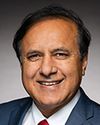That's perfect. Thank you very much, Madam Chair.
I want to start today by acknowledging that I am here on the traditional and unceded territories of the Algonquin Anishinabe peoples.
I am Christiane Fox, Deputy Minister for Immigration, Refugees and Citizenship Canada, or IRCC. I would like to thank the Committee for the invitation to appear. As mentioned, I am joined by Scott Harris, Michèle Kingsley, Operations and Jason Hollmann.
Canada is a top destination for people from all over the world who are seeking a better life. Our communities are welcoming, inclusive and diverse. Our economy provides many opportunities for work, and we offer an exceptional quality of life.
We have seen significant demand to come to Canada, with 2021 being a record-setting year for permanent immigration, with over 405,000 new permanent residents. The 2022 admissions are expected to pass 2021 in most immigration programs, including permanent residency, student visas, refugees and family reunifications.
And when Canada lifted its pandemic-related border measures earlier this fall, there was a renewed surge of asylum seekers, in particular at Roxham Road.
It is important to note that Canada’s asylum system and refugee resettlement program are separate. The asylum system is for people making refugee protection claims from within Canada.
Three organizations share the mandate for the asylum system: the Immigration and Refugee Board, the IRB, Immigration, Refugees and Citizenship Canada, or IRCC, and the Canada Border Services Agency, CBSA. Additionally, the RCMP plays an active role in policing the border between points of entry.
An asylum seeker entering a point of entry would be met by a CBSA officer. For irregular arrivals, an RCMP officer is the first point of contact upon crossing into Canada, before being transferred to CBSA to process their claim.
IRCC handles asylum claims by individuals already in Canada temporarily, possibly as a student or a visitor, who then decide to seek asylum.
Asylum seekers can make their claim at a port of entry upon arrival or online if they are already in Canada. If IRCC or CBSA determines that an individual is eligible to make an asylum claim, the claim is then referred to the IRB to assess whether the claimant requires Canada’s protection.
Individuals whose refugee claims are determined to be well-founded by the IRB receive protected person status in Canada and can apply for permanent residency.
If an individual’s refugee claim is determined to not be well founded, CBSA oversees the removal process. The individuals are released on condition to report for a future removal proceeding, which is managed by the CBSA.
Canada’s asylum system has been under significant strain due to sustained, high numbers of asylum claimants seeking our country’s protection. This year, Canada has already received over 62,000 asylum claims.
The Government of Canada continues to urge individuals to seek asylum in the first safe country they enter after fleeing persecution, as per the safe third country agreement, and not to resort to irregular crossings. Irregular routes can be dangerous and individuals may be subject to exploitation.
However, we do recognize that a large number of individuals have continued to enter Canada irregularly at Roxham Road.
In response, the government has set up capabilities to process arrivals, conduct safety verifications and health screenings, and ensure that migrants are assessed for eligibility of their applications.
IRCC has been working to support CBSA in addressing the backlog to determine eligibility and admissibility to Canada.
Budget 2022 provided asylum delivery partners with $1.3 billion over five years, and $331.2 million ongoing, to support the long-term stability and integrity of Canada’s asylum system. This funding will support a stronger system in the years ahead.
Recognizing that the determination process can take time and that higher volumes are causing delays, Canada provides asylum claimants support throughout the process.
The federal government has been providing temporary shelter to asylum seekers in Quebec and Ontario since the beginning of the pandemic at IRCC-leased hotels.
These facilities were initially established to support public health needs by providing newly arrived, asymptomatic claimants with an appropriate place to meet quarantine and testing requirements.
To support the Province of Quebec and City of Toronto, where the shelter networks have been overburdened with the increased volumes after November 2021, the government allowed claimants to stay in IRCC-leased hotels until a space was available in a shelter or claimants secured their own lodging.
The federal government has also provided support to provinces and municipalities through the temporary interim housing assistance program to reimburse some of the costs for housing asylum claimants—













